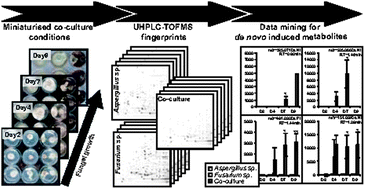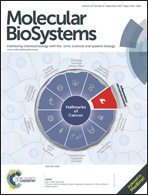Multi-well fungal co-culture for de novo metabolite-induction in time-series studies based on untargeted metabolomics†
Abstract
The induction of fungal metabolites by fungal co-cultures grown on solid media was explored using multi-well co-cultures in 2 cm diameter Petri dishes. Fungi were grown in 12-well plates to easily and rapidly obtain the large number of replicates necessary for employing metabolomic approaches. Fungal culture using such a format accelerated the production of metabolites by several weeks compared with using the large-format 9 cm Petri dishes. This strategy was applied to a co-culture of a Fusarium and an Aspergillus strain. The metabolite composition of the cultures was assessed using ultra-high pressure liquid chromatography coupled to electrospray ionisation and time-of-flight mass spectrometry, followed by automated data mining. The de novo production of metabolites was dramatically increased by nutriment reduction. A time-series study of the induction of the fungal metabolites of interest over nine days revealed that they exhibited various induction patterns. The concentrations of most of the de novo induced metabolites increased over time. However, interesting patterns were observed, such as with the presence of some compounds only at certain time points. This result indicates the complexity and dynamic nature of fungal metabolism. The large-scale production of the compounds of interest was verified by co-culture in 15 cm Petri dishes; most of the induced metabolites of interest (16/18) were found to be produced as effectively as on a small scale, although not in the same time frames. Large-scale production is a practical solution for the future production, identification and biological evaluation of these metabolites.


 Please wait while we load your content...
Please wait while we load your content...